Autonomous Buses are currently being developed in Singapore. To enhance Singapore’s land transport system, new forms of shared mobility in the form of autonomous vehicles are envisioned to improve the first and last-mile commute, bringing commuters from point to point in air-conditioned comfort.
The push for Autonomous Vehicles and the development and deployment of autonomous vehicles (AVs) is spearheaded by the Land Transport Authority (LTA) and the Committee on Autonomous Road Transport for Singapore (CARTS). The LTA has engaged in partnership agreements with multiple organizations to work on bringing autonomous buses to reality.
At present, multiple research groups are involved in the development of a prototype autonomous bus for Singapore. This article will focus on Autonomous Buses. while other forms of autonomous vehicles will be discussed at the bottom of this article.
Regulatory Framework
A report by research house Fitch Solutions Macro Research in March 2019, said that Singapore is now a step closer to autonomous vehicle adoption, with the publication of provisional national standards to guide the development and roll-out of autonomous vehicles. The standards, termed Technical Reference 68 (TR 68), were published by Enterprise Singapore in January. They aim to promote the safe deployment of fully autonomous vehicles in Singapore.
In a separate report released in February 2019, consulting firm KPMG International said Singapore is second in the world behind the Netherlands, and first in Asia in its readiness to adopt autonomous vehicles. This was judged based on four criteria – policy and legislation, technology and innovation, infrastructure, and consumer acceptance.
In Singapore, an Autonomous Vehicle assessment framework was developed and revised by LTA.
Plans (2017)
The Government has identified Punggol, Tengah and the Jurong Innovation District (JID) as areas where residents and workers can turn to self-driving buses and shuttles for their first- and last-mile commutes from 2022.
The plans, unveiled by Transport Minister Khaw Boon Wan on 22 November 2017, is the latest in Singapore’s drive towards adopting autonomous vehicle (AV) technology, alongside other applications announced earlier, such as driverless campus buses, truck platooning systems and unmanned road sweepers. At these three new towns, it is envisioned that robot buses will run scheduled services during off-peak periods to complement human-driven ones, while driverless shuttles can be summoned on demand by commuters.
Autonomous Public Bus
At the LTA-UITP Singapore International Transport Congress & Exhibition 2024, Minister for Transport Mr Chee Hong Tat mentioned in his opening speech that the Land Transport Authority (LTA) would be procuring autonomous minibuses to deploy in Singapore, together with a partner public bus operator.
LTA has also studied the deployment of autonomous minibuses, starting with less technically challenging bus routes with lower traffic and ridership.
Initially, the minibuses will have a safety driver on board and will be monitored for safety and reliability over a period, before transiting to having a remote safety operator instead.
Main Article: LTA Autonomous Bus Pilot
Punggol (2025 Plans)
In Q4 2025, a trial of AVs will begin in Punggol. This announcement, made by Acting Transport Minister Jeffrey Siow during his visit to Guangzhou in June 2025, served as a key milestone for the autonomous deployment in the area. The trial aims to test fixed-route AV services, connecting residential estates to transport hubs like MRT stations, in a bid to streamline mobility for residents.
Punggol was selected due to its well-established travel patterns, mature infrastructure, and the valuable feedback from local residents, which helped shape the proposed routes. The trial will initially see AVs running with a safety officer on board, before progressing to carrying passengers without one, provided the trial proves successful.
This deployment is seen as a significant step toward integrating autonomous technology into Singapore’s transport system, with further expansions anticipated in areas like Tengah if the trial is successful. The government’s careful approach to infrastructure adaptation, public safety, and workforce transitions is central to ensuring the smooth rollout of AVs in the future.
In September 2025, Ryde & Moovita announced that they have submitted a proposal to LTA for an autonomous bus pilot in Punggol.
As part of the Autonomous Shuttle Roadshow at Punggol Digital District held in September 2025, 3 new autonomous shuttle routes were announced at the event.
These routes will be operated by:
- Ai.R (by Grab-WeRide)
2 routes using 10 units of WeRide GXR (5 seater) & 1 unit of Robobus (8 seater) - Zig Driverless (by ComfortDelGro-Pony.ai)
1 route using vehicles developed by Pony.ai (Toyota Sienta)
Main Article: Autonomous Shuttle Trial at Punggol launching in mid-2026
Tengah
At the launch of the Autonomous Shuttle Roadshow at Punggol Digital District in September 2025, Acting Transport Minister Jeffrey Siow mentioned that the autonomous shuttle services will be taken to Tengah when “we are more confident, when Punggol gives us this confidence”.
Grab Autonomous Shuttle Trial
A 6-month autonomous shuttle trial by Grab commenced on 9 July 2025. The shuttle operates between the Grab office at Media Circle and one-north MRT Station during off-peak hours on weekdays, covering a 3.9km fixed loop to transport Grab employees. When not in use for employee transport, the vehicle will support training and technology development.
A safety operator will be on board to intervene if needed, in line with the requirements of LTA.
The autonomous technology partner for this trial is Autonomous A2Z, while operated on an electric BYD C6 bus fitted with sensors and software.
Moovita MooBus
Main Article: MooVita Autonomous Bus Trial at Ngee Ann Polytechnic
An autonomous vehicle developed by MooVita, based on a King Long electric minibus. Public trials were launched in January 2023, serving the Ngee Ann Polytechnic (NP) campus.
In February 2024, a similar unit in full white livery was spotted in Singapore with the registration plate of RD3229D. The owner of this unit has yet to be confirmed.
In 2025, one unit with the registration plate of RD3245G was also deployed on the Ngee Ann Polytechnic shuttle.
WeRide Robobus
The WeRide Robobus is a Level 4 autonomous driving-capable shuttle developed by the Chinese start-up WeRide and manufactured by Yutong Bus. As of 2023, the RoboBus has been deployed to 18 cities across the globe, mostly in China.
The autonomous robobus (left-hand-drive version) was brought into Singapore in late 2023 by WeRide (Singapore) Pte. Ltd. The bus has undergone passenger trials in Resorts World Sentosa since June 2024. In July 2025, the WeRide Robobus became the first driverless bus in Singapore to be approved for operations without a onboard safety officer.
Former Autonomous Bus Deployments
NTU-LTA-Volvo-SMRT Autonomous Bus (2019)
Main Article: NTU-LTA-Volvo Autonomous Bus Trial and Volvo 7900 Electric
The Nanyang Technological University (NTU) entered the Autonomous Bus scene in October 2016 when it signed an agreement with the LTA to develop autonomous bus technologies, including conducting a self-driving bus trial for fixed and scheduled services for intra- and inter-town travel. Under this collaboration, the Energy Research Institute @ NTU (ERI@N) would test and develop their self-driving vehicle technology with two electric hybrid buses. [Link]
The roads between NTU and CleanTech Park, which is located within Jurong Innovation District, were earmarked as potential test routes for the self-driving bus trial. It was envisaged that the trial could be extended in future to ferry commuters from NTU and Cleantech Park to Pioneer MRT station. The self-driving buses would feature opportunistic charging technology that will enable them to be recharged when they stop at a bus depot or bus stops.
In January 2018, Volvo Buses was brought on board the trial to develop electricity-powered autonomous buses, representing the company’s first foray into autonomous uses for buses and public transport. The project to develop the Autonomous Bus is led by the Nanyang Technological University (NTU)’s Centre of Excellence for Testing and Research of Autonomous Vehicles (CETRAN). Two Volvo 7900 Electric buses were being brought into Singapore as a testbed for development, with the first arriving in Singapore in late October 2018, and the second arriving several months later. The buses bear the registration numbers RD3162L and RD3169T respectively.
A launch ceremony was held in March 2019, branded as the world’s first full size, autonomous electric bus. Public transport operator SMRT was also brought on board as a partner, with the autonomous buses also tested at a bus depot managed by SMRT in order to assess its ability to autonomously navigate into vehicle washing bays and park safely at charging areas.
Technology:
The buses have Global Positioning System and lidar (light detection and ranging) sensors, which use laser beams to map the surrounding environment and detect obstacles. In addition, fast-charging technology by Swiss-Swedish engineering group ABB would be to charge up the buses’ batteries during layovers. In various cities in Europe, opportunity charging for buses via pantograph is an emerging technology being implemented for selected electric bus routes.
ST Kinetics Autonomous Buses
Main Articles: STE-Linkker Autonomous Electric Bus & ST Engineering STROBO Series 12 Bus
In April 2017, ST Kinetics (later ST Engineering Land Systems) signed a partnership with LTA to develop and trial autonomous buses. Under this partnership, ST would develop Autonomous Vehicle (AV) technologies and integrate them onto two 40-seater electric buses.
These prototype vehicles would undergo a three-and-a-half-year period of road trials expected to begin in mid-2020, with potential test grounds being Jurong Island and the National University of Singapore (NUS)’ campus. The eventual goal was to develop autonomous buses capable of running fixed and scheduled bus services for intra- and inter-town travel. Included in the announcement was ST Engineering’s concept sketch for a prototype autonomous bus featuring 3 doors.
In 2018, two of these autonomous buses were brought in by ST Engineering (both covered in this article). The first bus, based on the Linkker 12+ city bus, features a low-entry layout with three doors and a set of steps for the third door. The second bus is based on the Linkker 12 LF, bearing a prototype bodywork design resembling the sketches first revealed in 2017. The latter would feature more prominently in ST Engineering promotional materials and was also exhibited at various trade events.
Both buses were used for autonomous bus research and development between 2018 and 2022, including a four-month public trial at Jurong Island in 2021. ST Engineering discontinued its autonomous bus development efforts in late 2022.

Technology:
To navigate autonomously, the buses use a satellite-based Global Positioning (GPS) System and a suite of sensors to scan and determine their location and immediate surroundings. The buses also have radars and sonars that are able to detect other vehicles and pedestrians up to 200m ahead.
SBS Transit also contributed a 12-metre bus to the autonomous bus development. In 2018, one Scania K230UB (SBS8033D) was also fitted with the same suite of autonomous driving sensors, such as LIDAR sensors, ultrasonic sensors and visual cameras, possibly for data collection as part of the autonomous bus development.
ST Autobus
Main Article: ST Autonomous Mini-Bus (Autobus)
An autonomous vehicle developed by ST Engineering Land Systems, based on a Yinlong electric minibus platform. Two such vehicles were developed, and these vehicles participated in several public showcases and trials. ST Engineering discontinued its autonomous bus development efforts in late 2022.
ST Engineering STROBO Series 7 Bus
Main Article: ST Engineering STROBO Series 7 Bus – Autonomous Electric Bus
This bus is a BYD K6 electric bus fitted with the ST Engineering AV kit, as part of a partnership between ST Engineering and BYD. The bus was exhibited during the ITS World Congress 2019 in Singapore and subsequently registered as RD3174C in 2020. ST Engineering discontinued its autonomous bus development efforts in late 2022.
EasyMile EZ10
Main Article: EasyMile EZ10
Two units were first deployed on a 1.5-km loop within Gardens by the Bay in December 2015, dubbed the Auto Rider. The Auto Rider was officially launched on 22 June 2016 for public rides, with a capacity of 10 passengers (6 seating and 4 standing or 1 Wheelchair).
In 2019, another trial was conducted at NUS (see NUSmart Shuttle – Autonomous Bus Trial at NUS), funded by Inchcape Singapore and operated by ComfortDelGro Bus. The year-long trial aimed to gauge the commercial viability of a fully autonomous shuttle service. The vehicle was initially registered as RD3168X, later re-registered as RD3173E sometime in 2020.
The NUSmart Shuttle embarked on road tests starting in May 2019. Public trials commenced on 30 July 2019, but were suspended indefinitely from 7 April 2020 due to the COVID-19 pandemic. Testing of the bus continued without passengers, and the trial formally ceased on 26 January 2021.
Navya Autonom
Main Article: Navya Autonom Shuttle
An autonomous shuttle developed by French firm Navya, previously known as the Navya Arma. One unit was brought in by NTU in 2016 to shuttle passengers between NTU and Cleantech Park. In 2019, two different units participated in a 3-month operational trial led by ST Engineering.
To move autonomously, the Arma shuttle uses a Global Positioning System and four intelligent cameras that analyse road signs and traffic lights, along with eight lidar (light detection and ranging) sensors, which use laser beams to map its surrounding environment and detect obstacles.
In 2021, the shuttle vehicle was used in a trial to transport logistical supplies and personnel for the Singapore Armed Forces in Kranji Camp II, Kranji Camp III and Paya Lebar Air Base.
2getthere ParkShuttle
Main Article: 2getthere ParkShuttle
In 2017, a driverless electric shuttle was trialled on the NTU campus. The 2getthere ParkShuttle plied a short route between NTU Hall of Residence 12 & 15.
Plans were made to scale up the trial but were not known to have materialised. In April 2018, an MoU was signed between 2getthere, NTU and SMRT to include more locations on campus [Link] but this did not materialise.
MooVita MooShuttle miniP
This autonomous electric mini bus is fitted with MooVita’s AV technology and can sit 8 passengers.
The bus was exhibited during the ITS World Congress 2019 in Singapore, along with the MooVita MooShuttle miniB driverless buggy.
Self-driving car scene:
More information at:
CETRAN
A 1.8-hectare test facility was also constructed within the Jurong Innovation District just adjacent to NTU. The test circuit was opened in August 2016, and emulated a multitude of urban scenarios, including an area with simulated rainfall. The circuit was part of the Centre of Excellence for Testing and Research of Autonomous Vehicles – NTU (simply known as Cetran), which was set up by LTA and JTC in partnership with NTU and was operational in the 4th quarter of 2016.
External Links & References:
- Committee on Autonomous Road Transport for Singapore – Ministry of Transport
- Joint News Release by the Land Transport Authority (LTA), JTC & NTU – Paving the Way for the Safe and Effective Deployment of Self-driving Vehicles in Singapore – LTA
- NTU, LTA and JTC unveil Singapore’s first autonomous vehicle test centre – JTC
- Easymile
- Features of Auto Rider – Gardens by the Bay
- Autonomous Shuttle Trial Starts at the National University of Singapore – ComfortDelGro
- Opening Speech by Minister for Transport Mr Chee Hong Tat at Singapore International Transport Congress & Exhibition 2024 – Ministry of Transport
- Singapore to trial autonomous vehicles in Punggol from fourth quarter of 2025 – cna
- Grab to trial driverless shuttle for staff between Media Circle office and one-north MRT station – The Straits Times
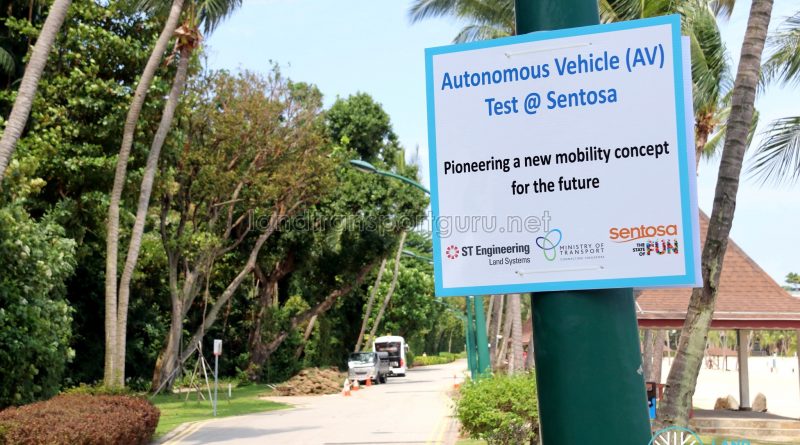
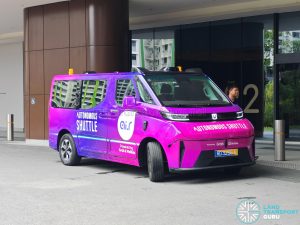
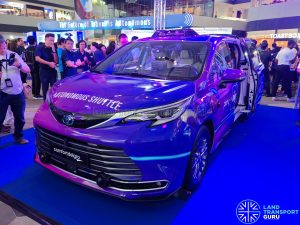
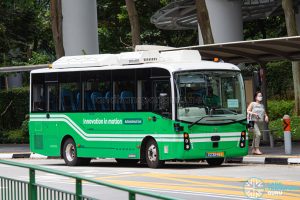
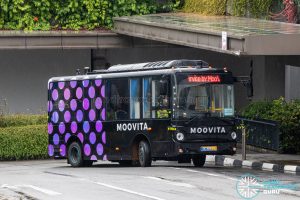
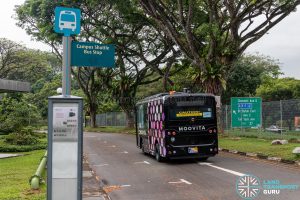
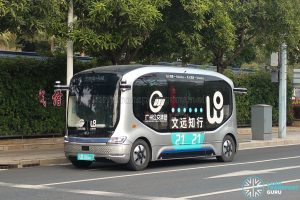
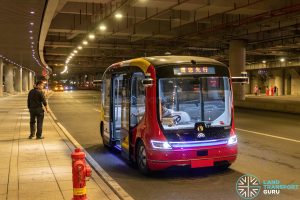
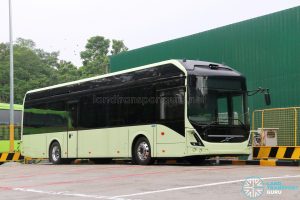
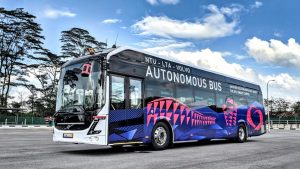
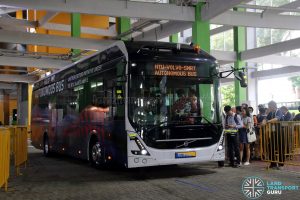
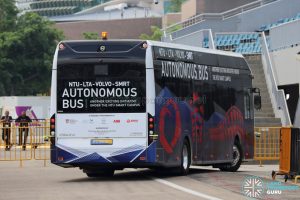
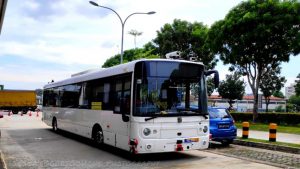
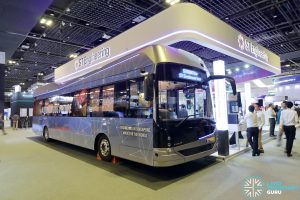
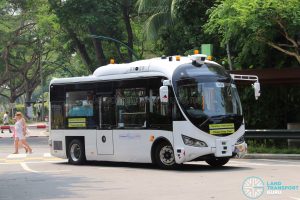
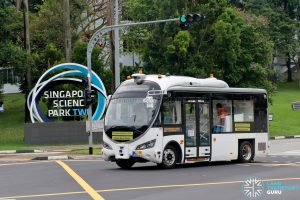
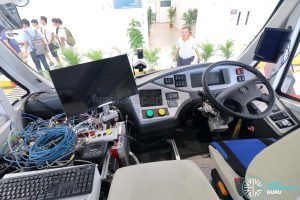
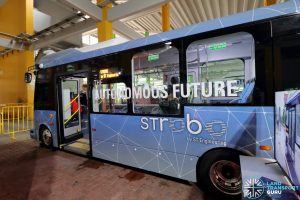

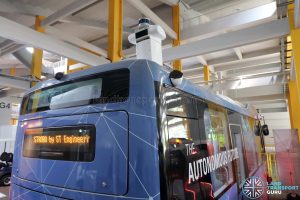
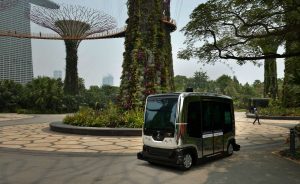
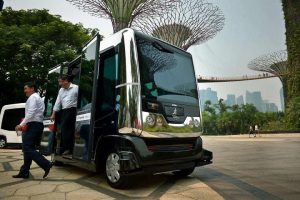
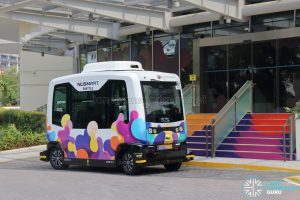
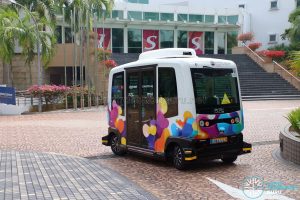
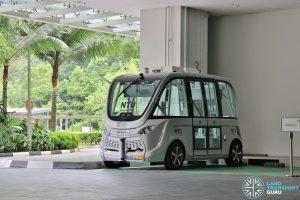
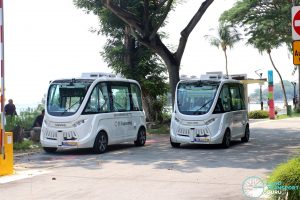
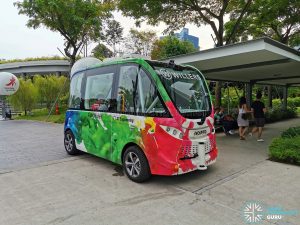
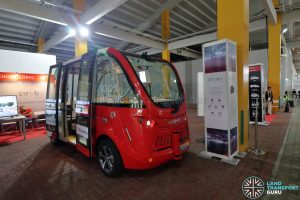
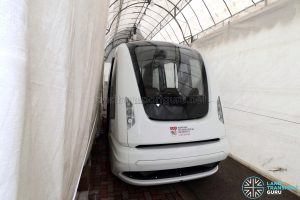
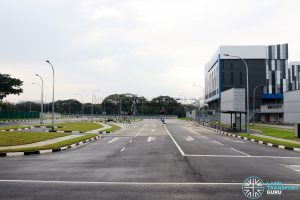
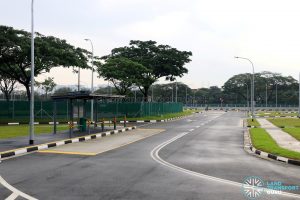
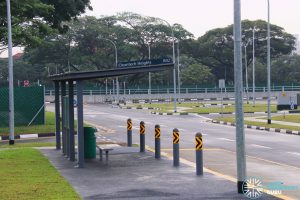
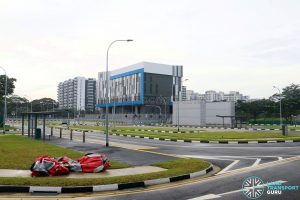
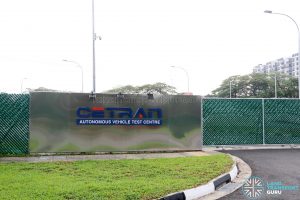
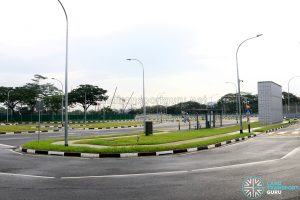
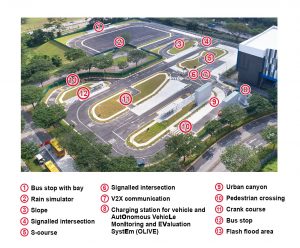
From today onwards (01st April 2021, Thursday), one of the SBST Euro 4 SK230UB Batch 1 buses (SBS8043A) from the sgwiki website and some sources has been reserved as an Autonomous Vehicle Trial of.